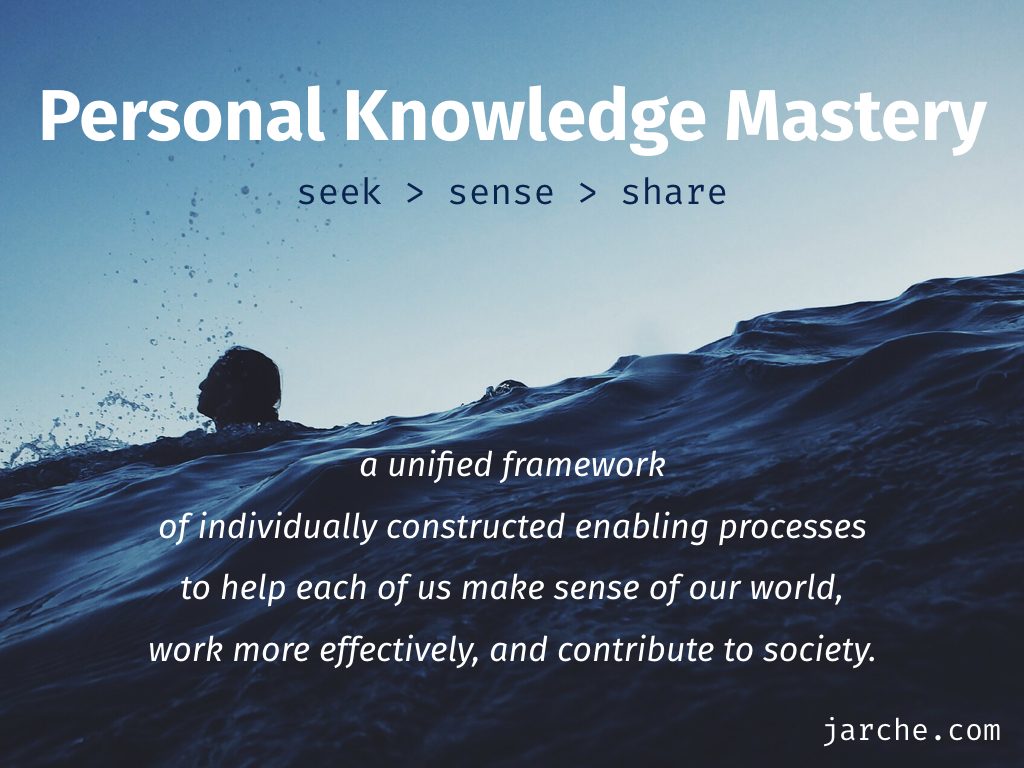“Any man who reads too much and uses his brain too little falls into lazy habits of thinking.” — Albert Einstein
Is reflection solely the realm of sitting and thinking on one’s own? Or is it the ebb and flow of conversations and making meaning through discourse? Time for silent reflection is undoubtedly beneficial, but can it enable us to understand other opinions and new ideas, or will it lead to narrow egocentric thinking instead? Our deepest learning often comes from our engagement with others. It can even hurt to learn. We learn socially, as humans have for millennia. While we need time for reflection, we need real experiences to reflect upon. This makes our learning personal: felt in our gut. Real learning is not abstract.
This has been my major challenge with the personal knowledge mastery (PKM) framework I have developed over the past 12 years. I learned about PKM on my own and through practice, reflection, and connecting with others. I later developed and modified the Seek > Sense > Share model. Through this process I have achieved some level of mastery, but I still have more to learn.
When I ran my first PKM workshop it was a day-long event through the University of Toronto’s iSchool. But I soon realized that one day was not enough time. Without time to follow-up and reflect, I was merely exposing people to some ideas, and few were able to take any action on them. Later, I developed the online 40 day program and while this was well received many people asked to do it again as they had not been able to do all of the activities. In 2016 I extended the 40 day program to 60 days. Some people excelled with this format. Others still did not have enough time. Nothing works for everyone.
There are few direct competitors to my PKM online workshop. I think it is because it’s hard to sell a difficult journey in an age of instant gratification. The workshop also requires a guide to help people on their journey. It does not work as a self-paced program without significant effort. Each cohort is provided several route options, and some people work together, others alone, and some hang out with the guide. Working as a cohort is essential for peer-to-peer learning, and many professional relationships have developed between participants over the years. The other hard-sell, especially to compliance-obsessed organizations, is that I do not provide a certificate. If I did, it would be short: This person has started a journey toward personal knowledge mastery.
Mastery of any discipline takes time and effort. I can only get people started. My PKM workshop was described to me as a ‘guided trip up a mountain, taking you to the base camp’. But there are no short cuts. The rest of the journey is for each person to take.
PKM is the ability to make sense of our digital and physical surround. It is a discipline that effectively filters ‘fake news’ and counters the trend to a ‘post-truth’ era. PKM puts us in charge of our learning. The PKM framework shows the need to develop a knowledge network and connect with mechanical and human filters, curators, and aggregators of information. From this diverse source of information and knowledge each person must develop appropriate sense-making methods. These are many and varied and there is no one correct method. While seeking information, through reading and other methods, is fine, one must do something with it. This is sense-making. It takes time, effort, practice, and reflection.
Validating, synthesizing, and customizing our thoughts are ways to make sense for ourselves. By sharing these thoughts and ideas as concrete artifacts we expose ourselves to criticism, but also create the opportunity to build upon our knowledge. Sharing openly and as widely as possible increases opportunities for serendipitous connections that may lead to innovation.
PKM is based on the premise that work is learning, and learning is the work. The 60 day journey is sufficient to get started on the road to mastery. Many people who have taken the workshop have shared their continuing journeys to mastery. All these journeys began with one step. I walk with people for several more if they so desire, but I do not direct their steps. PKM is personal.
Harold Jarche
Latest posts by Harold Jarche (see all)
- The Internet Time Alliance Jay Cross Memorial Award for 2018 is presented to Mark Britz. - 5 July 2018
- Mastery takes time and effort - 16 February 2017

I have the same experience that it is very hard for people to get started through an online course with PKM – my most successful ones are combined with individual coaching. I wonder if the working out loud circles are not very similar after all, but provide the peer support in your journey?
I think peer support is very important, which is why my online workshops run as a cohort of 10 to 20 people. Organizing small groups or circles sounds like a good idea as well.